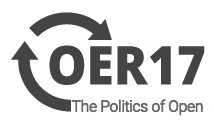 I attended the OER17 Conference in London, April 5–6, 2017, with my colleague Ellen Sexton and with support from the Teaching & Learning Center here at John Jay. Though I’m relatively new to the OER (open educational resources) conversation, issues of open access and open knowledge are dear to my heart.
I attended the OER17 Conference in London, April 5–6, 2017, with my colleague Ellen Sexton and with support from the Teaching & Learning Center here at John Jay. Though I’m relatively new to the OER (open educational resources) conversation, issues of open access and open knowledge are dear to my heart.
Here are my 4 biggest takeaways from OER17.
Note: the R in OER typically stands for resources, plural, so much of the literature has phrases like “OER have the benefit of…” But that sounds so wacky to my American ears, so I’m just going to go with OERs (plural) and an OER (singular). Most of the time.
What is open? Is “open” actually open?
In the United States, the discussion of OERs is inseparable from the conversation around the sharply rising costs of college textbooks. OERs, like this textbook from OpenStax, are pitched as one solution to this problem, and (in my experience) that’s the bulk of the conversation around OERs. So at OER17, I was surprised and pleased to hear international perspectives on OERs well beyond college textbooks: the general focus was contributing to and reusing public knowledge and public resources. Many sessions centered on Wikipedia and Wikidata, and MOOCs were even mentioned.
The keynote speaker, Maha Bali, opened the conference with important critical questions regarding “open.” Though the intentions of creating open materials may be good, she said, the result can end up reflecting biases and inequities that already exist. Perhaps the biggest example is the clear Anglo-centrism of existing OERs. We must ask ourselves when creating or using OERs: whose content is privileged? What language is it in? Whose culture is reflected? What is being implicitly taught in the “hidden curriculum” (a new term to me)?
Unless we ask ourselves these questions, we will simply reproduce these biases. “Inclusion must be engineered,” Bali quotes Sherri Spelic’s Digital Pedagogy lab post.
Moreover, open ≠ free (or libre). OERs aren’t free to create. They aren’t free to distribute (e.g., all web domains are rented, not owned; plus, IMO, free services aren’t really free). And regarding living “in the open” online, Bali pointed out that we are not equally vulnerable to trolling, harassment, and surveillance.
Maha Bali’s excellent slides and the recording are online.

